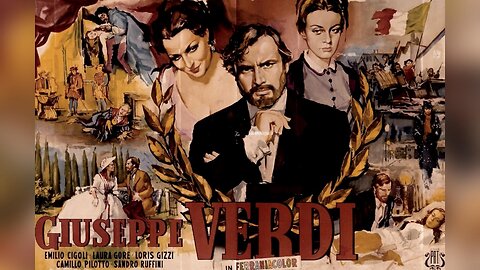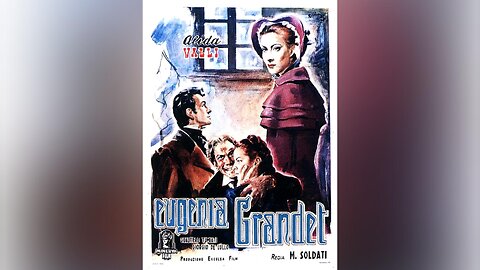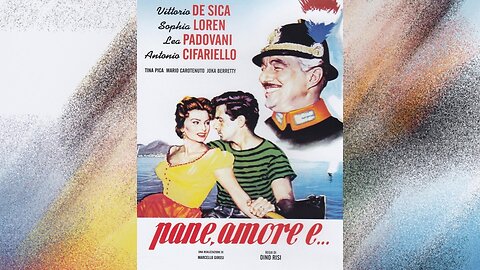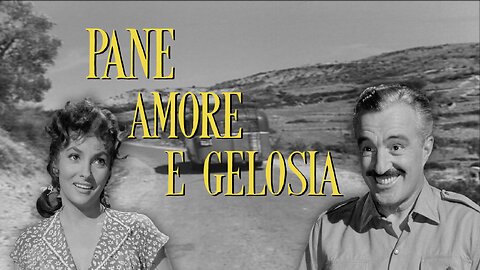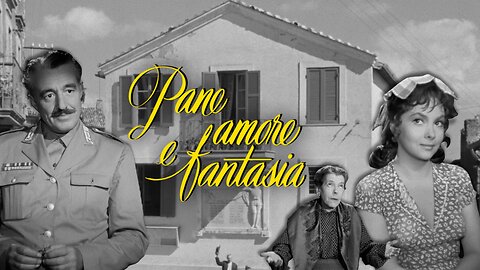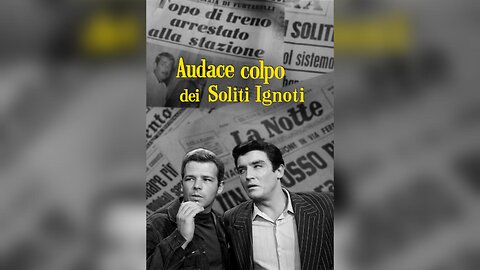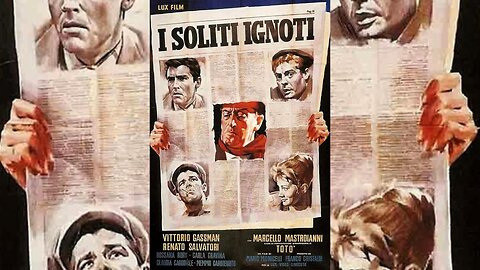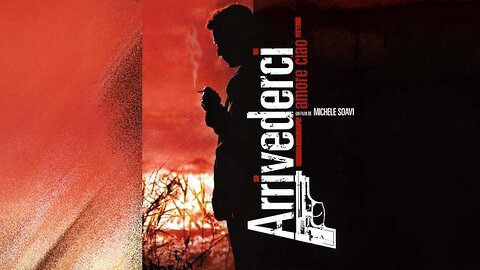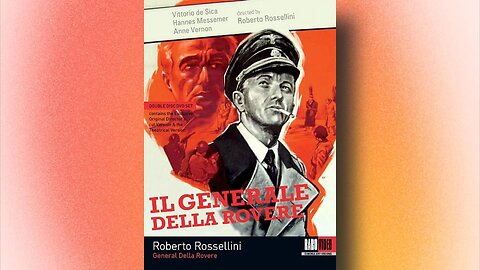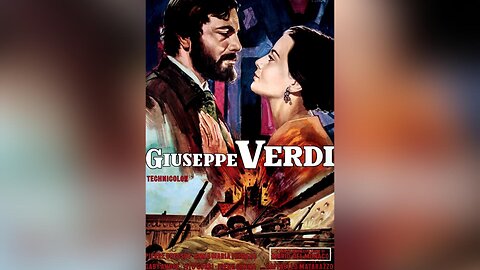
-
Giuseppe Verdi (Film 1953 - AUD ENG)
 Adaneth - Cinema&TVGiuseppe Verdi, released theatrically in the US as The Life and Music of Giuseppe Verdi and on video as Verdi, the King of Melody, is a 1953 Italian biographical musical melodrama film starring Pierre Cressoy and directed by Raffaello Matarazzo. It is based on adult life events of the composer Giuseppe Verdi. Audio (dubbed) in English. The life and loves of great composer Giuseppe Verdi are played against a background of the great operas of the 19th Century. A tender love story of his successful and turbulent life, with more than 20 excerpts from his acclaimed operas. Cast & Characters: Pierre Cressoy as Giuseppe Verdi Anna Maria Ferrero as Margherita Barezzi Gaby André as Giuseppina Strepponi Irene Genna as Violetta Laura Gore as Berberina Strepponi Camillo Pilotto as Antonio Barezzi Emilio Cigoli as Gaetano Donizetti Loris Gizzi as Gioachino Rossini Mario Del Monaco as Francesco Tamagno Tito Gobbi as Domenico Ronconi Aldo Bufi Landi as Alexandre Dumas, fils Guido Celano as Victor Hugo Franca Dominici as Rossini's Wife Mario Ferrari as Austrian Official Enrico Glori as Stage Director Turi Pandolfini as Bank Teller Teresa Franchini as Old Lady Gianni Agus Olga Vittoria Gentili Liana Del Balzo Lola Braccini Anna Vivaldi Lucia Banti18 views
Adaneth - Cinema&TVGiuseppe Verdi, released theatrically in the US as The Life and Music of Giuseppe Verdi and on video as Verdi, the King of Melody, is a 1953 Italian biographical musical melodrama film starring Pierre Cressoy and directed by Raffaello Matarazzo. It is based on adult life events of the composer Giuseppe Verdi. Audio (dubbed) in English. The life and loves of great composer Giuseppe Verdi are played against a background of the great operas of the 19th Century. A tender love story of his successful and turbulent life, with more than 20 excerpts from his acclaimed operas. Cast & Characters: Pierre Cressoy as Giuseppe Verdi Anna Maria Ferrero as Margherita Barezzi Gaby André as Giuseppina Strepponi Irene Genna as Violetta Laura Gore as Berberina Strepponi Camillo Pilotto as Antonio Barezzi Emilio Cigoli as Gaetano Donizetti Loris Gizzi as Gioachino Rossini Mario Del Monaco as Francesco Tamagno Tito Gobbi as Domenico Ronconi Aldo Bufi Landi as Alexandre Dumas, fils Guido Celano as Victor Hugo Franca Dominici as Rossini's Wife Mario Ferrari as Austrian Official Enrico Glori as Stage Director Turi Pandolfini as Bank Teller Teresa Franchini as Old Lady Gianni Agus Olga Vittoria Gentili Liana Del Balzo Lola Braccini Anna Vivaldi Lucia Banti18 views -
Giuseppe Verdi (Film 1953 - AUD ITA)
 Adaneth - Cinema&TVGiuseppe Verdi è un film del 1953 diretto da Raffaello Matarazzo, con sceneggiatura di; Leonardo Benvenuti [Leo Benvenuti], Liana Ferri, Mario Monicelli, Piero Pierotti, Giovanna Soria, Raffaele Matarazzo. Si tratta della biografia romanzata del celebre compositore Giuseppe Verdi. Il film ebbe molto successo tra il pubblico. Risultò il terzo maggior incasso in Italia della stagione cinematografica 1953-1954, preceduto solamente da Pane, amore e fantasia di Luigi Comencini e da Il ritorno di don Camillo di Julien Duvivier. Nel 2016 è stato presente nella sezione Festa Mobile / Festa Vintage del 34° Torino Film Festival in una versione restaurata e colorizzata (la pellicola originale fu realizzata in bianco e nero) dalla Cineteca Nazionale. Interpreti & Personaggi: Pierre Cressoy: Giuseppe Verdi Anna Maria Ferrero: Margherita Barezzi Gaby André: Giuseppina Strepponi Laura Gore: Berberina Strepponi Camillo Pilotto: Antonio Barezzi Emilio Cigoli: Gaetano Donizetti Loris Gizzi: Gioachino Rossini Mario Del Monaco: Francesco Tamagno Tito Gobbi: Giorgio Ronconi Aldo Bufi Landi: Alexandre Dumas figlio Guido Celano: Victor Hugo Irene Genna: Violetta Franca Dominici: moglie di Rossini Mario Ferrari: ufficiale austriaco Enrico Glori: direttore teatro Turi Pandolfini: impiegato del banco dei pegni Sandro Ruffini: impresario Varelli Enzo Biliotti: impresario Martini Gianni Agus Olga Vittoria Gentili Liana Del Balzo Lola Braccini Anna Vivaldi Teresa Franchini Lucia Banti21 views
Adaneth - Cinema&TVGiuseppe Verdi è un film del 1953 diretto da Raffaello Matarazzo, con sceneggiatura di; Leonardo Benvenuti [Leo Benvenuti], Liana Ferri, Mario Monicelli, Piero Pierotti, Giovanna Soria, Raffaele Matarazzo. Si tratta della biografia romanzata del celebre compositore Giuseppe Verdi. Il film ebbe molto successo tra il pubblico. Risultò il terzo maggior incasso in Italia della stagione cinematografica 1953-1954, preceduto solamente da Pane, amore e fantasia di Luigi Comencini e da Il ritorno di don Camillo di Julien Duvivier. Nel 2016 è stato presente nella sezione Festa Mobile / Festa Vintage del 34° Torino Film Festival in una versione restaurata e colorizzata (la pellicola originale fu realizzata in bianco e nero) dalla Cineteca Nazionale. Interpreti & Personaggi: Pierre Cressoy: Giuseppe Verdi Anna Maria Ferrero: Margherita Barezzi Gaby André: Giuseppina Strepponi Laura Gore: Berberina Strepponi Camillo Pilotto: Antonio Barezzi Emilio Cigoli: Gaetano Donizetti Loris Gizzi: Gioachino Rossini Mario Del Monaco: Francesco Tamagno Tito Gobbi: Giorgio Ronconi Aldo Bufi Landi: Alexandre Dumas figlio Guido Celano: Victor Hugo Irene Genna: Violetta Franca Dominici: moglie di Rossini Mario Ferrari: ufficiale austriaco Enrico Glori: direttore teatro Turi Pandolfini: impiegato del banco dei pegni Sandro Ruffini: impresario Varelli Enzo Biliotti: impresario Martini Gianni Agus Olga Vittoria Gentili Liana Del Balzo Lola Braccini Anna Vivaldi Teresa Franchini Lucia Banti21 views -
Eugenia Grandet (Film 1946-ENG SUB)
 Adaneth - Cinema&TVEugenia Grandet (also known as Eugenie Grandet) is a 1946 Italian historical drama film directed by Mario Soldati. It is based on the 1833 novel Eugénie Grandet by Honoré de Balzac. Audio in Italian with English subtitles (click on CC for subtitles). The novel has been adapted into films on a number of occasions. The film's sets were designed by art director Gastone Medin. The film entered the competition at the 7th Venice International Film Festival. For her performance Alida Valli won the Nastro d'Argento for Best Actress. The film also won the Nastro d'Argento for Best Scenography. Cast & Characters: Alida Valli as Eugenia Grandet Giorgio De Lullo as Charles Grandet Gualtiero Tumiati as Felix Grandet Giuditta Rissone as Eugenia's mother Maria Bodi as Madame Des Grassins Giuseppe Varni as Mr. Des Grassins Pina Gallini as Nanon Lina Gennari as Marquise D'Aubrion Enzo Biliotti as Notary Cruchet Liana Del Balzo101 views
Adaneth - Cinema&TVEugenia Grandet (also known as Eugenie Grandet) is a 1946 Italian historical drama film directed by Mario Soldati. It is based on the 1833 novel Eugénie Grandet by Honoré de Balzac. Audio in Italian with English subtitles (click on CC for subtitles). The novel has been adapted into films on a number of occasions. The film's sets were designed by art director Gastone Medin. The film entered the competition at the 7th Venice International Film Festival. For her performance Alida Valli won the Nastro d'Argento for Best Actress. The film also won the Nastro d'Argento for Best Scenography. Cast & Characters: Alida Valli as Eugenia Grandet Giorgio De Lullo as Charles Grandet Gualtiero Tumiati as Felix Grandet Giuditta Rissone as Eugenia's mother Maria Bodi as Madame Des Grassins Giuseppe Varni as Mr. Des Grassins Pina Gallini as Nanon Lina Gennari as Marquise D'Aubrion Enzo Biliotti as Notary Cruchet Liana Del Balzo101 views -
Pane, amore e…/Scandal in Sorrento (Film 1955 - MULTISUB)
 Adaneth - Cinema&TVPane, amore e...(English title: Scandal in Sorrento) is a 1955 Italian comedy film directed by Dino Risi. Audio in Italian with subtitles in; Italian, English, German, Russian, Frenach and Spanish (Click on CC for subtitles). This is the third film of the trilogy, formed by Bread, Love and Dreams in 1953, Bread, Love and Jealousy in 1954. Innovations include the use of color rather than black and white, as well the location of Sorrento instead of the small village of the previous films of the series. At the 6th Berlin International Film Festival it won the Honorable Mention (Best Humorous Film) award. Cast & Characters: Vittorio De Sica as Maresciallo Carotenuto Sophia Loren as Donna Sofia, a Smargiassa Lea Padovani as Donna Violante Ruotolo Antonio Cifariello as Nicola Pascazio, Nicolino Tina Pica as Caramella Mario Carotenuto as Don Matteo Carotenuto Virgilio Riento as Don Emidio64 views
Adaneth - Cinema&TVPane, amore e...(English title: Scandal in Sorrento) is a 1955 Italian comedy film directed by Dino Risi. Audio in Italian with subtitles in; Italian, English, German, Russian, Frenach and Spanish (Click on CC for subtitles). This is the third film of the trilogy, formed by Bread, Love and Dreams in 1953, Bread, Love and Jealousy in 1954. Innovations include the use of color rather than black and white, as well the location of Sorrento instead of the small village of the previous films of the series. At the 6th Berlin International Film Festival it won the Honorable Mention (Best Humorous Film) award. Cast & Characters: Vittorio De Sica as Maresciallo Carotenuto Sophia Loren as Donna Sofia, a Smargiassa Lea Padovani as Donna Violante Ruotolo Antonio Cifariello as Nicola Pascazio, Nicolino Tina Pica as Caramella Mario Carotenuto as Don Matteo Carotenuto Virgilio Riento as Don Emidio64 views -
Pane, amore e gelosia/Bread, Love and Jealousy (Film 1954 - MUSLTISUB)
 Adaneth - Cinema&TVPane, amore e gelosia known as Frisky in the US, is a 1954 Italian romantic comedy film directed by Luigi Comencini. Audio in Italian with subtitles in; Italian, English, Russian and French (click on CC for subtitles). It is the second part of the Italian trilogy, preceded by Bread, Love and Dreams and followed by Scandal in Sorrento. Cast & Characters: Vittorio De Sica as Antonio Carotenuto Gina Lollobrigida as Maria De Ritis Marisa Merlini as Annarella Mirziano Maria-Pia Casilio as Paoletta Virgilio Riento as Don Emidio Tina Pica as Caramella Tecla Scarano as Teresinella Saro Urzì as Don Nicola, il capocomico Roberto Risso as Pietro Stelluti Memmo Carotenuto as Sirio Baiocchi Vittoria Crispo as Maria Antonia De Ritis64 views
Adaneth - Cinema&TVPane, amore e gelosia known as Frisky in the US, is a 1954 Italian romantic comedy film directed by Luigi Comencini. Audio in Italian with subtitles in; Italian, English, Russian and French (click on CC for subtitles). It is the second part of the Italian trilogy, preceded by Bread, Love and Dreams and followed by Scandal in Sorrento. Cast & Characters: Vittorio De Sica as Antonio Carotenuto Gina Lollobrigida as Maria De Ritis Marisa Merlini as Annarella Mirziano Maria-Pia Casilio as Paoletta Virgilio Riento as Don Emidio Tina Pica as Caramella Tecla Scarano as Teresinella Saro Urzì as Don Nicola, il capocomico Roberto Risso as Pietro Stelluti Memmo Carotenuto as Sirio Baiocchi Vittoria Crispo as Maria Antonia De Ritis64 views -
Pane, amore e fantasia/Bread, Love and Dreams (Film 1953 - MULTISUB)
 Adaneth - Cinema&TVPane, amore e fantasia (English Title: Bread, Love and Dreams) is a 1953 Italian romantic comedy film directed by Luigi Comencini. Audio in Italian with subtitles in; English, Russian and Italian (click on CC for subtitles). At the 4th Berlin International Film Festival it won the Silver Bear award. In 2008, the film was included on the Italian Ministry of Cultural Heritage’s 100 Italian films to be saved, a list of 100 films that "have changed the collective memory of the country between 1942 and 1978". The film is set in Sagliena, an imaginary small town in central Italy; Marshal Antonio Carotenuto, an elderly womanizer who will have to adapt to the monotonous and quiet life of the village, is transferred here immediately after the war. Supported by the maid Caramella, the marshal runs the local Carabinieri station. Here he meets "Pizzicarella la Bersagliera", a young local girl secretly in love with the carabiniere Stelluti.42 views
Adaneth - Cinema&TVPane, amore e fantasia (English Title: Bread, Love and Dreams) is a 1953 Italian romantic comedy film directed by Luigi Comencini. Audio in Italian with subtitles in; English, Russian and Italian (click on CC for subtitles). At the 4th Berlin International Film Festival it won the Silver Bear award. In 2008, the film was included on the Italian Ministry of Cultural Heritage’s 100 Italian films to be saved, a list of 100 films that "have changed the collective memory of the country between 1942 and 1978". The film is set in Sagliena, an imaginary small town in central Italy; Marshal Antonio Carotenuto, an elderly womanizer who will have to adapt to the monotonous and quiet life of the village, is transferred here immediately after the war. Supported by the maid Caramella, the marshal runs the local Carabinieri station. Here he meets "Pizzicarella la Bersagliera", a young local girl secretly in love with the carabiniere Stelluti.42 views -
Audace colpo dei soliti ignoti/Fiasco in Milan (Film 1959 - ENG SUB)
 Adaneth - Cinema&TVAudace colpo dei soliti ignoti (also known as Fiasco in Milan or Hold-up à la milanaise) is a 1959 Italian comedy crime film directed by Nanni Loy. Audio in Italian with English and Italian subtitles (click on CC for subtitles). The film stars Vittorio Gassman, Renato Salvatori and Claudia Cardinale. It is the sequel to Mario Monicelli's I soliti ignoti (1958) and is followed by Big Deal After 20 Years (1985).80 views
Adaneth - Cinema&TVAudace colpo dei soliti ignoti (also known as Fiasco in Milan or Hold-up à la milanaise) is a 1959 Italian comedy crime film directed by Nanni Loy. Audio in Italian with English and Italian subtitles (click on CC for subtitles). The film stars Vittorio Gassman, Renato Salvatori and Claudia Cardinale. It is the sequel to Mario Monicelli's I soliti ignoti (1958) and is followed by Big Deal After 20 Years (1985).80 views -
I soliti ignoti/Big Deal on Madonna Street (Film 1958-ENG SUB)
 Adaneth - Cinema&TVI soliti ignoti (released as Big Deal on Madonna Street in US and as Persons Unknown in the UK) is a 1958 Italian comedy caper film directed by Mario Monicelli. Audio in Italian with English subtitles (click on CC for subtitles). Regarded as one of the masterpieces of Italian cinema, the film received an Academy Award nomination for Best Foreign Language Film. The plot revolves around the comedic mishaps of a group of small-time thieves attempting to burgle a pawn shop in Rome. The main characters are portrayed by Vittorio Gassman, Renato Salvatori, Carlo Pisacane, Tiberio Murgia, and Marcello Mastroianni. The film contributed significantly to the careers of Gassman and Mastroianni, with the former breaking into comedic roles previously considered unsuitable for him. Claudia Cardinale makes a minor appearance as a chaste Sicilian girl constrained by her overprotective brother, portrayed by Murgia. Cardinale achieved fame for her subsequent work. The film's breezy jazz score by composer Piero Umiliani contributed to the development of the jazz soundtracks characteristic of European films in the 1960s and 1970s. Initially doubtful about the film's potential success, the producers strategically featured the comedian Totò on the original poster to generate audience attention. Totò's character serves as a consultant to the heist gang instead of directly joining them. In 2008, it was included in the Italian Ministry of Cultural Heritage's list of 100 Italian films to be saved, acknowledging its impact on the collective memory of the country between 1942 and 1978. The film's original Italian title literally translates as "the usual unknown ones," which is roughly equivalent to the English phrase "the usual suspects." The name of the Roman street in the English title is a slight mistranslation, as the Italian name of the fictional Roman street where the burglary takes place is the Via delle Madonne ("The Street of the Madonnas") rather than "Madonna Street." Compounding the confusion is the fact that the real Roman street on which the scene was filmed is the Via delle tre cannelle ("The Street of the Three Spouts"), rather than the Via delle tre Madonne ("The Street of the Three Madonnas"). According to director Mario Monicelli, while the film was intended as a parody of neorealism, "by then neorealism was already a thing of the past, something that was surpassed. It was more a parody that was aligned with a certain realism around us, with the poverty, and with people who had to do the best they could with whatever means possible to survive, with petty crimes." Asked if it was also a parody of Jules Dassin's film Rififi, Monicelli said: "Yes because we saw this as a film shot in a very harsh, realist style. Very scientific, as the Peppe character continually says. So we wanted to do the same thing, but the characters didn't have the means. The way they worked was quite the contrary actually." Monicelli and cinematographer Gianni Di Venanzo agreed on a photographic tone that was not comedic or brightly lit. "On the contrary," Monicelli said, "harsh and dramatic, because the film has a dramatic side in that it is about poor people. But Di Venanzo understood the tone. To make people laugh with a story that was dramatic rather than comic. But seen with a comic eye." The film was shot in ten weeks on locations throughout Rome. Monicelli said: "The only interior that was shot in a studio was the wall that gets broken into at the end, because I couldn't break a wall in an actual apartment! But all the other interiors were shot on location. Which of course was a particular trait of Italian cinema, to shoot on location." According to Monicelli, the film adhered to the script, without improvisations. The film was a hit in Italy when it was released and won two Italian Nastro d'Argento awards: Best Leading Actor (Gassman) and Best Screenplay. It also garnered the prestigious Silver Shell for Best Director at the San Sebastián Film Festival in Spain. The film won Best Comedy at the 12th annual Locarno Film Festival in Switzerland. The film was also Italy's Oscar nominee for Best Foreign Language Film at the 31st Academy Awards. It lost to Jacques Tati's Mon Oncle. Two remakes of the film were shot in the United States: the 1984 film Crackers by Louis Malle (set in San Francisco) and the 2002 film Welcome to Collinwood by Anthony Russo and Joe Russo (set in Cleveland). Bob Fosse created a Broadway musical titled Big Deal based on the film. Set in 1930s Chicago with an African-American cast and using popular songs of the era, the show opened at the Broadway Theatre on April 10, 1986, and closed on June 8, 1986, after 69 performances. It received five Tony Award nominations, with Fosse winning for his choreography.90 views 1 comment
Adaneth - Cinema&TVI soliti ignoti (released as Big Deal on Madonna Street in US and as Persons Unknown in the UK) is a 1958 Italian comedy caper film directed by Mario Monicelli. Audio in Italian with English subtitles (click on CC for subtitles). Regarded as one of the masterpieces of Italian cinema, the film received an Academy Award nomination for Best Foreign Language Film. The plot revolves around the comedic mishaps of a group of small-time thieves attempting to burgle a pawn shop in Rome. The main characters are portrayed by Vittorio Gassman, Renato Salvatori, Carlo Pisacane, Tiberio Murgia, and Marcello Mastroianni. The film contributed significantly to the careers of Gassman and Mastroianni, with the former breaking into comedic roles previously considered unsuitable for him. Claudia Cardinale makes a minor appearance as a chaste Sicilian girl constrained by her overprotective brother, portrayed by Murgia. Cardinale achieved fame for her subsequent work. The film's breezy jazz score by composer Piero Umiliani contributed to the development of the jazz soundtracks characteristic of European films in the 1960s and 1970s. Initially doubtful about the film's potential success, the producers strategically featured the comedian Totò on the original poster to generate audience attention. Totò's character serves as a consultant to the heist gang instead of directly joining them. In 2008, it was included in the Italian Ministry of Cultural Heritage's list of 100 Italian films to be saved, acknowledging its impact on the collective memory of the country between 1942 and 1978. The film's original Italian title literally translates as "the usual unknown ones," which is roughly equivalent to the English phrase "the usual suspects." The name of the Roman street in the English title is a slight mistranslation, as the Italian name of the fictional Roman street where the burglary takes place is the Via delle Madonne ("The Street of the Madonnas") rather than "Madonna Street." Compounding the confusion is the fact that the real Roman street on which the scene was filmed is the Via delle tre cannelle ("The Street of the Three Spouts"), rather than the Via delle tre Madonne ("The Street of the Three Madonnas"). According to director Mario Monicelli, while the film was intended as a parody of neorealism, "by then neorealism was already a thing of the past, something that was surpassed. It was more a parody that was aligned with a certain realism around us, with the poverty, and with people who had to do the best they could with whatever means possible to survive, with petty crimes." Asked if it was also a parody of Jules Dassin's film Rififi, Monicelli said: "Yes because we saw this as a film shot in a very harsh, realist style. Very scientific, as the Peppe character continually says. So we wanted to do the same thing, but the characters didn't have the means. The way they worked was quite the contrary actually." Monicelli and cinematographer Gianni Di Venanzo agreed on a photographic tone that was not comedic or brightly lit. "On the contrary," Monicelli said, "harsh and dramatic, because the film has a dramatic side in that it is about poor people. But Di Venanzo understood the tone. To make people laugh with a story that was dramatic rather than comic. But seen with a comic eye." The film was shot in ten weeks on locations throughout Rome. Monicelli said: "The only interior that was shot in a studio was the wall that gets broken into at the end, because I couldn't break a wall in an actual apartment! But all the other interiors were shot on location. Which of course was a particular trait of Italian cinema, to shoot on location." According to Monicelli, the film adhered to the script, without improvisations. The film was a hit in Italy when it was released and won two Italian Nastro d'Argento awards: Best Leading Actor (Gassman) and Best Screenplay. It also garnered the prestigious Silver Shell for Best Director at the San Sebastián Film Festival in Spain. The film won Best Comedy at the 12th annual Locarno Film Festival in Switzerland. The film was also Italy's Oscar nominee for Best Foreign Language Film at the 31st Academy Awards. It lost to Jacques Tati's Mon Oncle. Two remakes of the film were shot in the United States: the 1984 film Crackers by Louis Malle (set in San Francisco) and the 2002 film Welcome to Collinwood by Anthony Russo and Joe Russo (set in Cleveland). Bob Fosse created a Broadway musical titled Big Deal based on the film. Set in 1930s Chicago with an African-American cast and using popular songs of the era, the show opened at the Broadway Theatre on April 10, 1986, and closed on June 8, 1986, after 69 performances. It received five Tony Award nominations, with Fosse winning for his choreography.90 views 1 comment -
Arrivederci amore, ciao/The Goodbye Kiss (Film 2006 - ENG & FRE SUB)
 Adaneth - Cinema&TVArrivederci amore, ciao (English Title: The Goodbye Kiss, also known as Goodbye My Love, Goodbye) s a 2006 Italian neo-noir film directed by Michele Soavi. It is based on the pulp novel Arrivederci amore, ciao by Massimo Carlotto. Audio in Italian with English & French subtitles. After fifteen years spent as a terrorist in the Central American jungle, former left-wing activist Giorgio Pellegrini decides to return to Italy. The film won the David di Donatello for best original song ("Insieme a te non ci sto più", performed by Caterina Caselli and written by Paolo Conte and others). Cast & Characters: Alessio Boni as Giorgio Pellegrini Michele Placido as Ferruccio Anedda Isabella Ferrari as Flora Alina Nedelea as Roberta Carlo Cecchi as Sante Brianese Antonello Fassari as Sergio Cosimato Max Mazzotta as Ciccio Formaggio124 views
Adaneth - Cinema&TVArrivederci amore, ciao (English Title: The Goodbye Kiss, also known as Goodbye My Love, Goodbye) s a 2006 Italian neo-noir film directed by Michele Soavi. It is based on the pulp novel Arrivederci amore, ciao by Massimo Carlotto. Audio in Italian with English & French subtitles. After fifteen years spent as a terrorist in the Central American jungle, former left-wing activist Giorgio Pellegrini decides to return to Italy. The film won the David di Donatello for best original song ("Insieme a te non ci sto più", performed by Caterina Caselli and written by Paolo Conte and others). Cast & Characters: Alessio Boni as Giorgio Pellegrini Michele Placido as Ferruccio Anedda Isabella Ferrari as Flora Alina Nedelea as Roberta Carlo Cecchi as Sante Brianese Antonello Fassari as Sergio Cosimato Max Mazzotta as Ciccio Formaggio124 views -
Il generale Della Rovere (Film 1959 - MULTISUB)
 Adaneth - Cinema&TVIl General Della Rovere (English title: General Della Rovere) is a 1959 Italian–French drama film directed by Roberto Rossellini. Audio in Italian with subtitles in; English, French and Russian (click on CC for subtitles). The film is based on a story by Indro Montanelli which was in turn based on a true story. The film on the Golden Lion at the 1959 Venice International Film Festival. Genoa, 1944, during the era of the Italian Social Republic. Petty thief Emanuele Bardone is hired by the German occupation forces to impersonate an Italian Resistance leader, General Della Rovere, and infiltrate a group of resistance prisoners in a Milan prison. Gradually, Bardone loses himself in his role and not merely pretends to be a hero of the resistance but actually becomes one. Cast & Characters: Vittorio De Sica: Vittorio Emanuele Bardone/Grimaldi Hannes Messemer: SS Colonel Müller Vittorio Caprioli: Aristide Banchelli Sandra Milo: Olga Giovanna Ralli: Valeria Maria Greco: Madama Vera Herbert Fischer: German sergeant Anne Vernon: Clara Fassio Franco Interlenghi: Antonio Pasquali Ivo Garrani: Partisan Chief Linda Veras: German Attendant The film is based on a story by Indro Montanelli which was in turn based on a true story.128 views
Adaneth - Cinema&TVIl General Della Rovere (English title: General Della Rovere) is a 1959 Italian–French drama film directed by Roberto Rossellini. Audio in Italian with subtitles in; English, French and Russian (click on CC for subtitles). The film is based on a story by Indro Montanelli which was in turn based on a true story. The film on the Golden Lion at the 1959 Venice International Film Festival. Genoa, 1944, during the era of the Italian Social Republic. Petty thief Emanuele Bardone is hired by the German occupation forces to impersonate an Italian Resistance leader, General Della Rovere, and infiltrate a group of resistance prisoners in a Milan prison. Gradually, Bardone loses himself in his role and not merely pretends to be a hero of the resistance but actually becomes one. Cast & Characters: Vittorio De Sica: Vittorio Emanuele Bardone/Grimaldi Hannes Messemer: SS Colonel Müller Vittorio Caprioli: Aristide Banchelli Sandra Milo: Olga Giovanna Ralli: Valeria Maria Greco: Madama Vera Herbert Fischer: German sergeant Anne Vernon: Clara Fassio Franco Interlenghi: Antonio Pasquali Ivo Garrani: Partisan Chief Linda Veras: German Attendant The film is based on a story by Indro Montanelli which was in turn based on a true story.128 views
